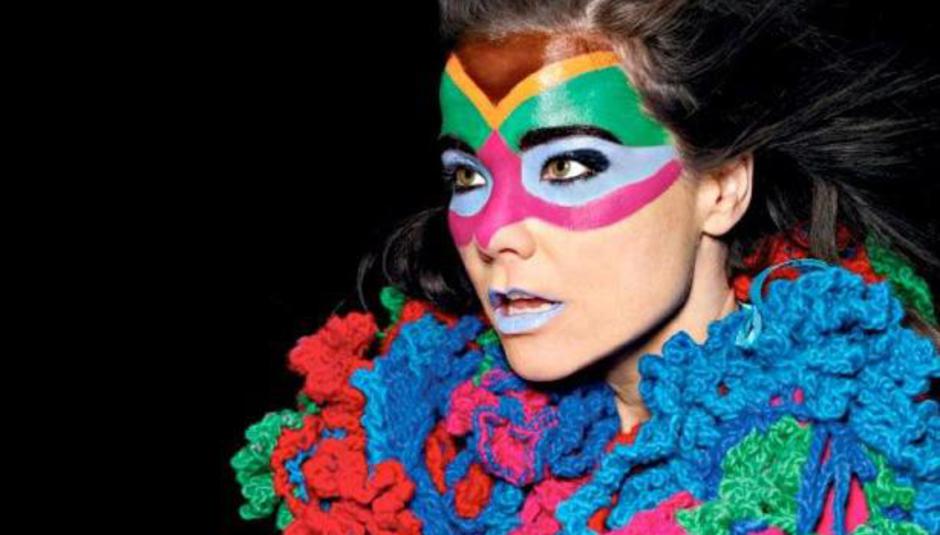One of the things you realise pretty quickly around Björk is that for all her colourful flamboyance, her eccentricity and her sometimes child-like awe and wonder, she is not naïve. She is fiercely intelligent and hard-working and despite spending the better part of her life trapped inside the distorted mirror ball of her own celebrity, her engagement with the world around her is honest and clear-sighted. In particular, the passion for nature which she espouses so readily on Biophilia would be easy to dismiss as abstract whimsy if it were not for the fact that she has proved herself unafraid to engage wholeheartedly with grassroots environmental activism and to take on big business without ever displaying a pop star's sense of entitlement.
She described her radicalisation in a 2008 op-ed for The Times, in which she wrote about how she'd been forced to stop living "happily in the land of music-making" when she realised that "politicians seem bent on ruining Iceland's natural environment".
As activist groups like Saving Iceland have identified, Iceland's bankrupt government is currently scrambling to cash in their few remaining chips by granting permission for huge tracts of land to be torn up for aluminium plants while simultaneously signing a secretive and ludicrous contract to sell off Icelandic energy producer HS Orka to Canada's Magma Energy Corp in a deal which grants the corporation exclusive access to some of the country's largest geothermal reserves for the next 130 years.
Björk first got involved in the protests in 2004, when she played at the Hætta concert in Reykjavík which had been organised in opposition to a new Alcoa aluminium smelter. She then founded an organisation called Náttúra and has taken up campaigning in a way that was new to her: “It was another thing I thought I’d never get into, funnily enough,” she laughs. “I’m breaking all my own taboos!"
Although Náttúra faces a huge struggle to protect Iceland's landscape, there are echoes of similar battles being fought across the world. We talk about the Dongria Kondh tribe in Orissa, India, where I used to live, who recently won a historic battle against Vedanta Resources to save their forest lands and stop their sacred Niyamgiri mountain being turned into an open-pit bauxite mine. “It’s great," she says, "I've been following this since about a year ago.”
She says she never intended to become involved in this sort of activism: "I always felt music was better if it wasn’t political, but I live on an island which I guess is about the same size as England – without Wales and Scotland – but it’s only got 350,000 people. It’s the biggest untouched area in Europe. You can imagine how we felt: not just me, but the majority of Icelanders, when we found out that behind the scenes for 20 years the right-wing rednecks had been planning to harness all of its energy. I mean, already we’re over the pollution mark that the Kyoto agreement set, so that would just be gone! I just had to do something about it.”
---
She says that at first she had been complacent: “We had two huge aluminium smelters and they were going to build a third one. I thought ‘that’s not going to happen’. There was a lot of protest, everybody went bonkers, people came from all over the world… and it still got built!”
After that, she could no longer content herself with just turning up for benefit concerts: “That was 2005-6, and after that I was just like…” She mimes rolling up her sleeves. “It’s about my children or my grandchildren. I had believed it would be stopped. There were a lot of people in government who were against it, but it still didn’t get stopped. I wouldn’t be able to live with myself, when I’m old and looking at my grandchildren, unless I at least gave it a whack.”
With the lack of alternative employment opportunities being cited as the critical factor, Björk decided to get creative: “In the autumn of 2008 I spent four months on it full time. It sounds maybe odd, but it seemed to me and my friends that the best way to do it was to go to the rural areas and ask ‘Why aren’t you thinking of starting other companies?’ We figured out very quickly that legally it was impossible for these people to start start-up companies. If you had a village of 500 or 1,000 people, and 20 people are unemployed, then if they could start three little companies they’d be fine. Basically they wanted to build an aluminium smelter there and then the people who were unemployed from ten villages would all come and get jobs. But if instead you could start one company that would grow their own vegetables… I mean, it doesn’t all have to be hippy, green things… you could start a data centre or an online company!"
"We basically went and wrote out lists of 500 companies that were possible to inspire people and so we basically ended up with 150 people who were cherry-picked, and we had a brain-storming weekend, and then we had a lot of really influential people in Iceland but also a lot of people who started start-up companies which nobody thought would work: like gaming companies that hire now 2,000 people but were set up by two guys who are half my age. So these kind of people. We wrote a manifesto, not a thick one but just a functional manifesto and took it to the Prime Minister and said ‘These are laws that you can change now and they’d make things easier for little start-up companies.’ It was silly things. For example, fish is under a monopoly, so you can’t have fish markets in the villages. Which is insane when they’re catching these fish right there. You can’t have sushi restaurants. It was a collection of stuff like this, you know? So that did something, not much, and then was the privatisation of access to Iceland’s energy sources. After the bank crash, it was sneaked through, so then started a year-long fight to try to raise awareness. We did a petition online, I don’t know if you saw it?”
I tell her I did see the petition, which called for a referendum to decide whether the country's natural resources should be publicly owned. Then I tell her I also saw the remarkable series of open letters that went back and forth between her and Magma Energy CEO Ross Beaty last year, in which he at one point offered to sell her a 25% stake in the Icelandic energy company HS Orka. She eloquently rebuffed him, writing back: “you totally miss my point. i feel this company should not be privatized , it should be given back to the people. therefore i am not interested in shares.”
When I mention the letters she laughs loudly and scowls in pantomime disapproval.
“He is so cocky! So cocky! So anyway, to cut a long story short we got 47,000 people to sign a petition to give to the government to not privatise access to our energy resources. That’s like 25% of voters! But like what you were saying about India, it’s a cobweb. For three years, half of my time went into this and then in January I realised that if I didn’t go full time on my project it would never, never happen. So in January 2011 I organised the karaoke marathon and then I took the next plane out and said; ‘Now I have to focus on my project.’ I think with my project I can be proactive, do you know what I mean?”
---
After hosting a three-day karaoke marathon in January this year to attract attention to her calls for a referendum, Björk decided that making her own music was the best way to get people talking and engage them with environmental issues.
“That was actually one of the driving points, emotionally, for Biophilia. Instead of standing on a chair and criticising and going ‘Ner-ner-ner-ner-ner’ why didn’t I come up with solutions? I ended up being… touch-screens… internet… ok… solutions. After the bank crash and seeing all the people who lost their houses and lost their pensions because of what 20 crazy venture-capitalists did, my problems were superficial. After trying to encourage people who’ve got nothing, to tell them: ‘Come on!’” She claps emphatically. “‘You could start your own fishing company! You could grow mussels! Harness the tide! You can do it!’ Then when you come back to your home, to your studio… you cannot be lazy. It’s like karma. If you’re saying to other people that it’s no big deal, then you have to give it a go yourself. You have to practise what you preach, you know?”
It wasn’t just witnessing other people in trouble that spurred her on, she had her own problems as well: “There are so many things that used to work that don’t work anymore. Not only with the music industry, but I lost my voice… I got nodules on my voice and had to learn a totally new technique. I didn’t know if I could sing again. So on so many different levels it seemed like all the old systems were off the table, and it was a case of: ‘Let’s just do simple stuff that works’. It’s an interesting irony that this project maybe comes across as being pretentious and complicated, but for me, how I experienced it for three years was very DIY. We’d run out of budget. It was as if all these old systems, these palaces, had tumbled down and it’s like: ‘Ok. Here’s a spoon. Here’s a cup.’” She picks them up off the table and mimes a pestle and mortar: a picture of single-minded determination.
You felt like you could rip it up and start again?
“Yeah. That’s how it felt to me to do it really.”
---
Having spoken about the failings of the music industry in general, and about running out of budget herself, I’m intrigued as to how she manages to fund a project as singular and ambitious as Biophilia. The live show alone is reported to be a vastly expensive undertaking. Is she actually making any money?
“Well I’ve always felt that because I’ve got money from my albums that I should use them to make the next project. It’s been one of the reasons that every project has been so different, because I felt that somebody was rewarding me for being brave! If I stopped being brave it would stop! If I started being stingy, the project would be stingy. So far in my career, I’ve usually used the money from each project to pay for the next one. So for this project, I could pay for the making of the album, that is the music. I got the Polar Music Prize, from Sweden, a year ago, and that’s quite a generous prize, so I paid for the instruments with that, but I couldn’t pay for the apps.”
The Polar Music Prize is worth one million Swedish kronor, just under £100,000, which paid for the unique instruments she showcased at her summer residency at the Manchester International Festival.
“The concert in Manchester, we just about made it on zero. I mean, that’s success, as far as I’m concerned. I’ve got a house in England, I’ve got a house in New York, I’ve got a house in Iceland, I don’t need anything more, you know? I’m fine. Once I stop making music… once I stop making money from music, I’ll sell one house! So after I stop making money from music… I can make albums for a few years, at least the next ten years, from selling the houses I’ve got! I’m not trying to be rich; it’s more that I want to solve riddles. For example, with the music industry: it tumbled ten years ago, and I felt that I wasn’t doing anything about it, really. Probably I was having it too good or something! But now I can say ‘I postponed it too long’. Also maybe because I come from this punk background where there was only 80,000 people in the village I was brought up in – the capital, you know? – and there was a big company there already that sold Abba and Beethoven or whatever, put out the commercial Icelandic musicians. We didn’t want to be part of that. We knew that it’s no big deal putting out an album. I think a lot of musicians think it’s this kinda thing where you have to send your music to all the big labels. It’s more of a psychological, confidence thing: ‘If I’m good enough, they will like my demo.’ But I mean I did it all for ten years. I’ve done it: making the album in somebody’s bedroom, making the poster yourself.”
Do you think that’s what you’d be doing if you were just starting out now?
“I think so. I think because I had that background, I knew when the music industry started tumbling that it wasn’t a big deal. I knew it from experience. I haven’t always been able to just hand out my demo and get a response. I’ve done it myself. Taking buses around Reykjavik and putting the posters up myself. Now, with the internet, that’s exactly what you do. What I’m trying to say… in a really complicated way, I’m sorry!… is that I felt that if somebody would know what could be possible it would be somebody of my generation. I’ve had it quite good for a decade, so that I can take this kind of risk, you know? But I think it was also very driven by the stuff I was doing in Iceland.”
Part 1: Beginnings - Part 2: Biophilia
Part 3: Bootlegs - Part 4: Business – Part 5: Boundlessness






















